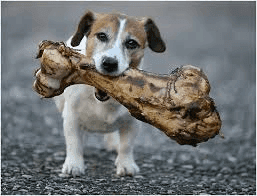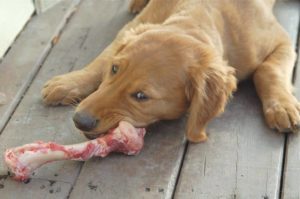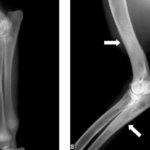There are no bones about it, bones are bad for dogs. Even the FDA felt strongly enough on the topic and recently posted an article about the ill-effects of bones on dogs, pet owners should take heed; it’s something general practitioners, emergency veterinarians and veterinary dentists have said for years.
Below are some of the problems:
Pet Illnesses Reported
“Some people think it’s OK to give dogs large bones to chew on” says Carmela Stamper, a veterinarian in the Center for Veterinary Medicine (CVM) at the Food and Drug Administration (FDA). “But giving your dog a bone might lead to an unexpected trip to your veterinarian, a possible emergency surgery, or even death for your pet.”
FDA has received about 35 reports of pet illnesses related to bone treats and seven reports of product problems, such as bones shattering when pulled from their packaging. The reports, sent in by pet owners and veterinarians, involved about 45 dogs.
of product problems, such as bones shattering when pulled from their packaging. The reports, sent in by pet owners and veterinarians, involved about 45 dogs.
A variety of commercially-available bone treats for dogs—including treats described as “Ham Bones,” “Pork Femur Bones,” “Rib Bones,” and “Smokey Knuckle Bones”—were listed in the reports. Many of these products differ from uncooked butcher-type bones because they are processed and packaged for sale as dog treats. The products may be dried through a smoking process or by baking, and may contain other ingredients such as preservatives, seasonings, and smoke flavorings.
Pet owners and veterinarians have reported the following illnesses in dogs that have eaten bone treats:
- Gastrointestinal obstruction (blockage in the digestive tract)
- Choking
- Cuts and wounds in the mouth or on the tonsils
- Vomiting
- Diarrhea
- Bleeding from the rectum
- Death. Approximately eight dogs reportedly died after eating a bone treat.
Things You Can Do

“We recommend supervising your dog with any chew toy or treat, especially one she hasn’t had before,” adds Stamper. “And if she ‘just isn’t acting right,’ call your veterinarian right away!”
To report a problem with a pet food or treat, please visit FDA’s Web page on “How to Report a Pet Food Complaint” or call CVM at 240-402-7002.
This article appears on FDA’s Consumer Updates page, which features the latest on all FDA-
Bones and Teeth – something has to give
Aside from the FDA, veterinarians have long cautioned that bones can wear down or fracture a dog’s teeth. Over time, when two hard substances meet, one has to give. Over your dog’s lifespan, bone chewing often results in worn teeth that can expose the pulp chamber (where blood vessels and nerves are) or can lead to a traumatic tooth fracture. In both instances, the tooth becomes non-viable and is a source of pain and infection and will require oral surgery to remove the damaged tooth or have a root canal performed.
Urban Animal Veterinary Hospital
1327 Yale St
Houston, TX 77008
(713) 863-0088


